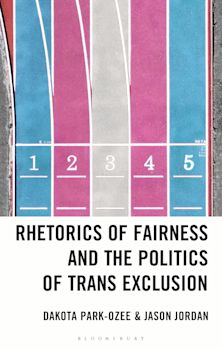- Home
- ACADEMIC
- Communication Studies
- Rhetoric
- Purpose, Practice, and Pedagogy in Rhetorical Criticism
Purpose, Practice, and Pedagogy in Rhetorical Criticism
Jim A. Kuypers (Anthology Editor) , Edwin Black (Contributor) , Jason Edward Black (Contributor) , Dana L. Cloud (Contributor) , Celeste M. Condit (Contributor) , J. Michael Hogan (Contributor) , Andrew A. King (Contributor) , Ryan Erik McGeough (Contributor) , Raymie E. McKerrow (Contributor) , Martin J. Medhurst (Contributor) , Ned O'Gorman (Contributor) , Samantha M. Senda-Cook (Contributor) , Robert E. Terrill (Contributor) , Kathleen J. Turner (Contributor) , Marilyn J. Young (Contributor)
Purpose, Practice, and Pedagogy in Rhetorical Criticism
Jim A. Kuypers (Anthology Editor) , Edwin Black (Contributor) , Jason Edward Black (Contributor) , Dana L. Cloud (Contributor) , Celeste M. Condit (Contributor) , J. Michael Hogan (Contributor) , Andrew A. King (Contributor) , Ryan Erik McGeough (Contributor) , Raymie E. McKerrow (Contributor) , Martin J. Medhurst (Contributor) , Ned O'Gorman (Contributor) , Samantha M. Senda-Cook (Contributor) , Robert E. Terrill (Contributor) , Kathleen J. Turner (Contributor) , Marilyn J. Young (Contributor)
This product is usually dispatched within 3 days
- Delivery and returns info
-
Free US delivery on orders $35 or over
You must sign in to add this item to your wishlist. Please sign in or create an account
Description
This edited volume fills a void in the literature concerning the purpose, practice, and pedagogy associated with performing rhetorical criticism. Literature regarding these issues—predominantly purpose—exists primarily as scattered journal articles and as sections within chapters of textbooks on rhetorical criticism. This book brings together 15 established rhetorical critics, each of whom offers well thought out and argued opinion pieces that stress the more personal nature of criticism. The purpose of this book is to serve as a disciplinary resource, and as a teaching and learning aid.
Accessibility across areas of expertise and experience is stressed in this book. Critics range from junior faculty to emeritus, and represent a broad spectrum of views on criticism. In this sense the book offers a snapshot of the views of a wide swath of successfully practicing, contemporary rhetorical critics.
Table of Contents
Edwin Black
Chapter 2: Paddling the Rhetorical River, Revisiting the Social Actor: Rhetorical Criticism as Both Appreciation and Intervention
Jason Edward Black
Chapter 3: Rhetorical Criticism for Underdogs
Dana L. Cloud
Chapter 4: How Should Our Rhetoric Make Us Feel?
Celeste M. Condit
Chapter 5: Rhetorical and Civic Literacy in the Twenty-First Century: A Neo-Classical Rhetoric for the Digital Age
J. Michael Hogan
Chapter 6: The Wilderness Years of Rhetorical Criticism: Our Obsession with Powerlessness
Andrew A. King
Chapter 7: Artistry, Purpose, and Academic Constraints in Rhetorical Criticism
Jim A. Kuypers
Chapter 8: Endless Talk: The Purpose, Practice, and Pedagogy of the Rhetorical Conversation
Ryan Erik McGeough
Chapter 9: The Critical Impulse
Raymie McKerrow
Chapter 10: Rhetorical Criticism as Textual Interpretation
Martin J. Medhurst
Chapter 11: The Moral Critic: An Act in Several Histories
Ned O’Gorman
Chapter 12: Practicing Rhetoric
Samantha M. Senda-Cook
Chapter 13: Rhetorical Criticism and Citizenship Education
Robert E. Terrill
Chapter 14: The Glory of Rhetorical Analysis: Communication as a Process Of Social Influence
Kathleen J. Turner
Chapter 15: The Accidental Rhetorician
Marilyn J. Young
Product details
| Published | Mar 27 2017 |
|---|---|
| Format | Paperback |
| Edition | 1st |
| Extent | 234 |
| ISBN | 9781498557221 |
| Imprint | Lexington Books |
| Dimensions | 9 x 6 inches |
| Series | Bloomsbury Studies in Political Communication |
| Publisher | Bloomsbury Publishing |
About the contributors
Reviews
-
Jim Kuypers assembled 15 top rhetorical critics to contribute to this excellent volume. . . .The audiences for criticism today are small, and scholars write in ways that further limit their potential agency. Kuypers’s edited collection, with the clarity of argument and audience present especially in a few chapters, offers a potential breakthrough.
Southern Communication Journal
-
Should Jim A. Kuypers’s Purpose, Practice, and Pedagogy in Rhetorical Criticism make its way to your bookshelf (and it should), you wouldbe right to put it close to other anthologies of rhetorical criticism—Carl Burgchardt’s with Strata, as well as Kuypers’s earlier collection withLexington, to name just two. At the same time, the book delivers somethingdifferent than ‘traditionally argued academic essays’ of or aboutrhetorical criticism. Instead, writes Kuypers, this is a book of ‘opinion
piece[s] that stress the very personal nature of criticism.’…. It is both pleasurable and edifying to read these scholars write about their formation as intellectuals, their different ways of giving meaning to rhetoric, their tricks in the classroom, their passion, and sometimes their anguish.Rhetoric & Public Affairs
-
This is an excellent volume that raises important questions for rhetorical critics about how we practice and teach our art. This book offers a range of candid and clear position statements by prominent scholars that take differing perspectives on what it means to do rhetorical criticism. It is rare to have a venue outside conferences, classrooms, and interpersonal conversations to openly reflect on the diversity of ways to practice and teach rhetorical criticism. This book expands the reach of these conversations to its readers and provides a valuable resource for new and experienced rhetorical critics. Doctoral students and junior scholars will particularly benefit from this volume as they seek to define their own positions and begin their teaching careers.
Danielle Endres, University of Utah
-
Jim Kuypers has assembled an impressive group of rhetorical scholars to provide a comprehensive overview of the contours surrounding rhetorical criticism for a twenty-first century world. The insightful chapters cover everything from what it means to do rhetorical criticism to how criticism can be practiced in a digital age. Scholars and students will provide from a book that discusses such wide-ranging issues and is a must for any serious rhetoric scholar today.
Jason A. Edwards, Bridgewater State University



































